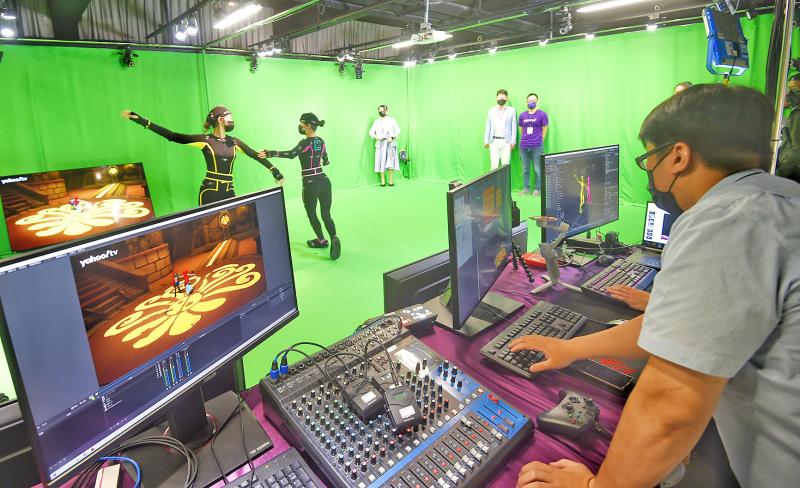Meta Platforms Inc yesterday launched Asia’s first physical hub for extended reality (XR) research in Taiwan, as Facebook’s parent company seeks to promote the immersive technologies.
At the “Meta XR Hub Taiwan” launch ceremony in Taipei, Meta head of agency for greater China Stephanie Chu (朱怡靜) described Taiwanese partners as an important cornerstone of technological development.
“Today marks another milestone of Meta’s establishment in Taiwan, and [the company] will work with Taiwanese partners to create the next generation of social technology,” Chu said.

Photo: Fang Pin-chao, Taipei Times
Taiwan is to play a huge part in the metaverse, Meta chief product officer Chris Cox said in a video presentation at the event.
Taiwan’s ability to build hardware and establish public infrastructure is unparalleled, and it has many outstanding creators, artists, researchers and developers engaged in the development of technologies and applications, he said.
As augmented reality and virtual reality flourish, Taiwan would not only become an important stronghold for the metaverse team, but also a key hub for driving global innovations, he added.
American Institute in Taiwan Director Sandra Oudkirk said that by establishing the XR Hub in Taipei, “Meta is demonstrating its belief that Taiwan will play a key role in the rapidly evolving metaverse industry.”
“Taiwan is a central node of the globe’s semiconductor ecosystem and a cutting-edge pioneer on emerging technologies like hardware-software integration, chipsets, processors, 5G and Wi-Fi 6,” Oudkirk said.
Taiwanese developers and artists have also won global awards for creating virtual reality content, she said, and “these are all essential elements in the metaverse.”
The XR hub in Taiwan is to collaborate with Taiwantrade to establish a platform in which people can digitally engage with each other, so that trade exhibitions would not be just limited to a physical or online event.
Taiwantrade is an interactive electronic business portal operated by the government-sponsored Taiwan External Trade Development Council.
President Tsai Ing-wen (蔡英文) said at the ceremony that the government would work hard to build a better environment for the development of the digital economy and expressed hope that Meta can continue to expand its investments in Taiwan.
Tsai said that the metaverse taking root in Taiwan would help drive local communication technology development and innovative applications, and prompt more companies to accelerate their participation in the metaverse.

PREPAREDNESS: Given the difficulty of importing ammunition during wartime, the Ministry of National Defense said it would prioritize ‘coproduction’ partnerships A newly formed unit of the Marine Corps tasked with land-based security operations has recently replaced its aging, domestically produced rifles with more advanced, US-made M4A1 rifles, a source said yesterday. The unnamed source familiar with the matter said the First Security Battalion of the Marine Corps’ Air Defense and Base Guard Group has replaced its older T65K2 rifles, which have been in service since the late 1980s, with the newly received M4A1s. The source did not say exactly when the upgrade took place or how many M4A1s were issued to the battalion. The confirmation came after Chinese-language media reported

A Ministry of Foreign Affairs official yesterday said that a delegation that visited China for an APEC meeting did not receive any kind of treatment that downgraded Taiwan’s sovereignty. Department of International Organizations Director-General Jonathan Sun (孫儉元) said that he and a group of ministry officials visited Shenzhen, China, to attend the APEC Informal Senior Officials’ Meeting last month. The trip went “smoothly and safely” for all Taiwanese delegates, as the Chinese side arranged the trip in accordance with long-standing practices, Sun said at the ministry’s weekly briefing. The Taiwanese group did not encounter any political suppression, he said. Sun made the remarks when

The Taiwanese passport ranked 33rd in a global listing of passports by convenience this month, rising three places from last month’s ranking, but matching its position in January last year. The Henley Passport Index, an international ranking of passports by the number of designations its holder can travel to without a visa, showed that the Taiwan passport enables holders to travel to 139 countries and territories without a visa. Singapore’s passport was ranked the most powerful with visa-free access to 192 destinations out of 227, according to the index published on Tuesday by UK-based migration investment consultancy firm Henley and Partners. Japan’s and

BROAD AGREEMENT: The two are nearing a trade deal to reduce Taiwan’s tariff to 15% and a commitment for TSMC to build five more fabs, a ‘New York Times’ report said Taiwan and the US have reached a broad consensus on a trade deal, the Executive Yuan’s Office of Trade Negotiations said yesterday, after a report said that Washington is set to reduce Taiwan’s tariff rate to 15 percent. The New York Times on Monday reported that the two nations are nearing a trade deal to reduce Taiwan’s tariff rate to 15 percent and commit Taiwan Semiconductor Manufacturing Co (TSMC, 台積電) to building at least five more facilities in the US. “The agreement, which has been under negotiation for months, is being legally scrubbed and could be announced this month,” the paper said,